ACTIONS CORNER
Fresenius: Doubts over planned acquisition of Akorn
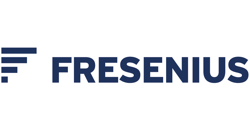 In a recent ad hoc-release, Fresenius SE provided guidance on its expectations for the year 2018 and its mid-term growth targets. The real surprise in this message turned out to be the information regarding an investigation into alleged breaches of FDA data integrity requirements at Akorn, Inc., relating to product development.
In a recent ad hoc-release, Fresenius SE provided guidance on its expectations for the year 2018 and its mid-term growth targets. The real surprise in this message turned out to be the information regarding an investigation into alleged breaches of FDA data integrity requirements at Akorn, Inc., relating to product development.
According to the release, the consummation of the (takeover-) transaction may be affected it the closing conditions under the merger agreement are not met. In a separate statement issued by Akorn on the same day, Akron added that the investigation has not found any facts that would result in an impact on Akorn´s operations and the company does not believe this investigation should affect the closing of the transaction with Fresenius. Nonetheless, the news sent the share price of Akron down by more then 30 percent.
Steinhoff International: Downgrade to SDAX level
It´s been a while since the negative news flow about Steinhoff International started. Recent bits and pieces included further irregularities with the financial reporting, ongoing changes on the management level, etc. Finally even BaFin became irritated and threatened to impose a fine.
And with its recent decisions on the indices composition, Deutsche Börse acted as well. In a press release, the company informed that Covestro will replace ProSiebenSat1 Media in the DAX index. In the same release, a side note mentioned that Steinhoff International will leave the MDAX index (downgrade to SDAX).
The (late) decision is a consequence of the rule set governing the indices composition. Unfortunately, these do not reflect the relevance of corporate governance issues in case of a corporate governance crisis . Perhaps its time to consider an amendment to the rules?
Deutsche Bank: Found a shortcut to affect its reputation
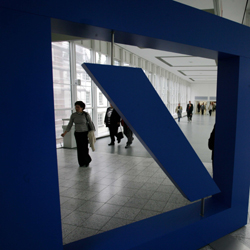 After a long phase of lousy results, a constant flow of bad news and the indication that 2017 will be the third consecutive year with an annual loss, Frankfurter Allgemeine Sonntagszeitung reported about Deutsche Bank´s decision to hike annual bonus payments to more than EUR 1 billion. According to the article, the move came amid concerns that otherwise investment bankers could be prompted to defect to more generous competitors.
After a long phase of lousy results, a constant flow of bad news and the indication that 2017 will be the third consecutive year with an annual loss, Frankfurter Allgemeine Sonntagszeitung reported about Deutsche Bank´s decision to hike annual bonus payments to more than EUR 1 billion. According to the article, the move came amid concerns that otherwise investment bankers could be prompted to defect to more generous competitors.
In recent years, the dummy argument that good and loyal employees might leave the company without high bonus payments has been used too often to justify extraordinary payments. Indeed, high bonus payments are justifiable if an annual loss occurred as a one-off incident and the reasons for the weak performance of the company are clearly addressed and under control. However, high bonus payments despite the third consecutive year with an annual loss might rather be an indication for a memory problem with the bank. If even the best are not good enough to make a profit, are high bonus payments really the best answer to address the problems? And by the way, does the management pay attention to the bank´s reputation?
Continental confirms ongoing examination aiming at an increased organizational flexibility
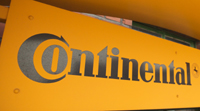 The speed of the innovation process in the automotive supplier industry is amazing. However, there is a clear segment differentiation, with electronics leading the pack, while traditional automotive industries did not show substantial breakthroughs in recent years. It is probably this background, which triggered Continental to take a closer look at its portfolio.
The speed of the innovation process in the automotive supplier industry is amazing. However, there is a clear segment differentiation, with electronics leading the pack, while traditional automotive industries did not show substantial breakthroughs in recent years. It is probably this background, which triggered Continental to take a closer look at its portfolio.
Following earlier speculations in the press the company confirmed that it is in early stages of analyzing how its organization can become more flexible in response to the “fast changing environment in the automotive industry”. Although the statement made clear that the evaluation is in its early stages still, it might become an interesting discussion topic at this year´s AGM to be held April 27th, 2018.
Thyssen-Krupp: Lively discussions at the AGM and ambiguous voting results
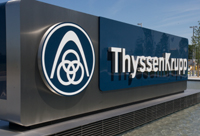 The restructuring plans of the thyssenkrupp management prompted a lively debate at this years´ AGM on January 19th, 2018. Already several weeks ahead, some critical voices could be heard. For example, the second largest shareholder, Cevian, made clear that it was dissatisfied with the strategic directions of the group and looking for a radical break-up. While this was discussed in more detail at the AGM, thyssenkrupp used the opportunity to explain its position to the audience. Referring to the recent past of the Group and the management´s plans, the CEO pointed out the managements view that the group is already undergoing substantial changes.
The restructuring plans of the thyssenkrupp management prompted a lively debate at this years´ AGM on January 19th, 2018. Already several weeks ahead, some critical voices could be heard. For example, the second largest shareholder, Cevian, made clear that it was dissatisfied with the strategic directions of the group and looking for a radical break-up. While this was discussed in more detail at the AGM, thyssenkrupp used the opportunity to explain its position to the audience. Referring to the recent past of the Group and the management´s plans, the CEO pointed out the managements view that the group is already undergoing substantial changes.
At first glance, the outcome of the voting at the AGM indicates a clear tendency in favor of the management´s position, with roughly 73 percent of equity represented and more than 94 percent of votes counted for the company´s proposals to shareholders. However, a closer look reveals a slightly different picture. While the number of shares casted for the dividend proposal equals approximately 73 percent of the total shares in issue (i.e. nearly all shares at present at the meeting), this number dropped to approximately 53 percent with most of the following agenda topics. In other words: 20 percent of the share capital present did not cast a vote at this AGM on most of the AGM topics. Perhaps this is an argument for the management to take a second look at the demands of the critical shareholders?
Note: In most AGM-systems used in Germany, abstention from voting is reported in the same category as are “not present”, “technical error”, “inadmissible”, etc. (if reported at all). Shareholders, depositary banks and advisors are often not aware of this specific feature, resulting in misinterpretations and other problems. Hence, VIP is requesting a change in the reporting to improve the transparency and enhance the quality of the information provided to shareholders about the outcome of AGMs.
<Abstimmungsergebnisse (voting results) 2018 - click here>
Kering (PUMA): Increased strategic flexibility for PUMA
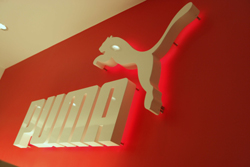 Kering, the French luxury group, which currently owns approx. 86 percent of PUMA, plans to propose to its shareholders to distribute shares equivalent to approx. 70 percent of the share capital of PUMA in the form of a dividend in kind.
Kering, the French luxury group, which currently owns approx. 86 percent of PUMA, plans to propose to its shareholders to distribute shares equivalent to approx. 70 percent of the share capital of PUMA in the form of a dividend in kind.
The step will result in a substantial increase in the free float in PUMA shares, enhance the liquidity in the stock and potentially pave the way for a later inclusion in indices like the MDAX. However, Kering´s largest shareholder, Artémis SA, is likely to receive 29 percent of the PUMA shares. Accordingly, PUMA will still have a key shareholder after the distribution, and the remaining free float would amount to 55 percent.
It goes without saying that the management of PUMA welcomed this move, since it provides additional strategic flexibility.















